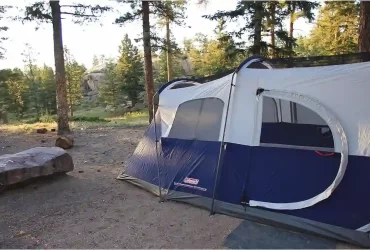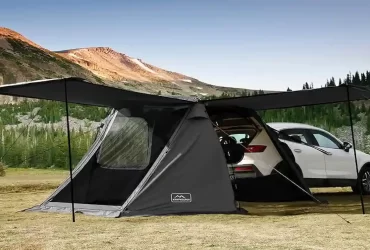Cleaning and drying a tent properly can be achieved through alternative methods. The tent can be hand-washed with mild detergent and air-dried over a clothesline or sturdy object after being hand-washed.
There is also the option of using the large commercial-sized front-loading washer and dryer at the laundromat.
If you intend to store the tent, make sure that it is completely dry before storing as this will prevent mold and mildew growth. You can ensure the durability and performance of your tent by taking proper care of it during your outdoor adventures.
How to Dry a Tent Before Putting in a Dryer
Tents can be tricky to dry in dryers and need to be carefully considered. Choosing the right tent material and following the manufacturer’s instructions is the first step. Depending on the tent, machine drying may not be suitable and could damage it.
The next thing you should do is determine the size and capacity of your dryer. It is important to make sure that the tent will fit inside without causing any problems. In addition, it’s important to consider possible damages.
Fabric can be weakened or torn by the heat and tumbling action of the dryer. Take these factors into consideration before putting your tent in the dryer to avoid costly and irreversible damage.
Also like this:
What’s the Point of Drying a Tent in a Dryer?

Drying a tent can be beneficial in a few ways. Keeping tents clean and maintaining them is essential. You can extend the life of your tent by cleaning it regularly. Easy removal of stains and odors is made possible by this product. You can clean your tent thoroughly by drying it in a dryer.
As the dryer heats and moves, dirt and grime are broken down. Nevertheless, you should check the instructions for your specific tent before using it. Depending on the tent, machine drying may not be an option. To prevent damage, make sure to follow the manufacturer’s instructions.
Tents need to be properly cared for so they can be used for many future outdoor adventures.
Maintenance and Cleaning of Tents without Dryers

A dryer does not have to be used for tent cleaning and maintenance. The use of handwashing techniques is an effective way to keep tents clean. A spot cleaning can also be useful for areas that require special attention.
You could also use a front-loading washing machine, which would be able to handle tents up to 60 feet long. Using these methods will prevent your tent from deteriorating and will prolong its life. In order to keep your tent clean, you should wash your hands and clean the areas of concern.
It is convenient to use a front-loading washing machine to wash large tents that cannot be dried in a dryer. With these alternative methods to dryer usage, you can clean and maintain your tent effectively for future adventures. Tents can be kept in top condition without using dryers.
What You Need to Know About Drying Tents

There is no need to put a tent in a dryer since both the tent and the dryer may be damaged. Nonetheless, if you don’t have time to wait for your tent to dry, you can follow these steps to do tent camping safe.
To prevent dirt and moisture from entering the tent, you should clean and dry it prior to use. After removing the stakes, ropes, and poles, you should be able to make your tent more compact. Ensure that the tent fits properly in the dryer by folding the tent systematically.
In order to prevent damage, do not overload the dryer, and use a low temperature setting. It is best to air dry tents if you want to maintain their longevity.
Tips for Drying a Tent in a Dryer Effectively
In the process of drying a tent, there are risks and drawbacks. It is possible for the tent fabric, seams, and waterproofing to become damaged. Furthermore, the dryer may overheat or malfunction. The tent warranty or return policy may also be impacted by this.
Before drying a tent, it’s important to take these factors into account.
Tent Maintenance After Drying
Look for any damage or wear and tear that requires attention on your tent. Waterproofing treatments should be applied if necessary to ensure the tent remains fully protected. Tents need to be stored properly over time in order to maintain their quality.
Maintaining your tent following a dryer can extend its lifespan and keep it in good shape for future use. In order to prevent further damage, check for potential issues regularly and address them immediately.
It will pay off in the long run to properly care for your tent, enabling you to enjoy many more outdoor adventures.
Drawbacks and risks associated with drying a tent
It can be risky to put a tent in a dryer because it can cause damage. Waterproofing, seams, and fabric of a tent may be damaged. Additionally, the dryer could overheat or malfunction. In addition, it may affect the tent’s warranty or return policy.
These factors should be taken into account before drying a tent.
Also like this:
Frequently Asked Questions
Why do tents need to be dried out?
If there is any loose dirt or debris on the tent, shake it off to dry it. You will need to wipe down the tent with a clean cloth to remove the moisture. Drying will be sped up if the tent is erected in an open area if it is sunny and dry outside.
Ensure that it is evenly spread out and the zippers are left open so that it can breathe. It is best to avoid direct sunlight in order to prevent damage. During inclement weather, you can hang the tent indoors in a well-ventilated area. Prevent moisture and humidity from entering the area.
Increase circulation by opening windows or turning on fans. The dry tent should be stored in a cool, dry place to prevent mildew growth. Preparing your tent for your next adventure is as easy as following these steps.
Is it possible to dry my tent without heat?
The dryer can be set to no-heat and you can use it for drying your tent.
Can you put a tent in a dryer?
The tent should not be placed in a dryer as it is neither safe nor recommended. It is possible for the fabric and structure of the tent to be damaged by heat and tumbling.





Leave a Reply
View Comments